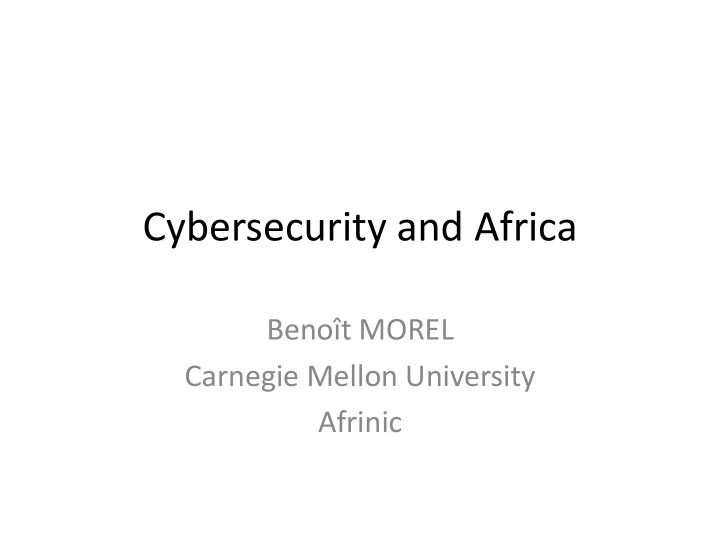

Cybersecurity and Africa Benoît MOREL Carnegie Mellon University Afrinic
Cyberization of Africa • The new big development in the cyberworld – 6.8% penetration population today – …but the growth is phenomenal • Changes the digital divide • Revolutionizes the economy and social structure of African countries • But this is at a time when cyberspace has become a very dangerous place
Need for quick progress in cybersecurity • Protecting government secrets (agent.btz) and messages (ghostnet) • Protecting financial information (silentbanker) • With high capacity connection: haven for botnets (Conficker) and other forms of infections • Critical infra-structures (of tomorrow?) and the cyber- protection of scada (Supervisory Control and Data Acquisition) • Need for “National CERTs ” (Computer Emergency Response Team)
Challenges • No template in US or Europe – (in fact their governments are not good examples to follow: too dependent on private security industry. No government is a leader in cybersecurity. Cybercriminals outsmart them) • Where to get the expertise: – No centralized repository of knowledge and expertise – Needs are specific: • what kind of training? • how large an operation a national CERT should it be? • Can it generate revenue live on its own or should it be a government agency? • Economics: – Cost of training, security tools – what to invest in, how much, what return on investment?
Some Answers • Building a national CERT is a protracted process. – Not a case of one size fits all: countries are different – Needs are evolving, – a lot of learning by doing, – cooperation among CERTs. (crisis management, national points of contact, keeping abreast) – Forum for Incident Response Teams (FIRST): • a “club” to which any CERT must belong (or at least seek to belong as a form of accreditation). • Tunisian example: – Only African CERT in FIRST – 6 years of experience, – experts in open source/free tools – Prepared to share their knowledge • In the US: – Carnegie Mellon has a lot of expertise and can be a precious interface between African countries and the rest of the US – National Defense university
National Defense University • 20 years of experience in training in cybersecurity taught them that: – Cybersecurity is not only about computers, it is also (mostly?) about information. – Their 14 weeks curriculum reflects that. • Originally designed for US government, – opened to foreign nationals • They want to open to Africa • Costs are limited as no money can come directly to them – (this has to go through the “local” US embassy) • They also go to foreign countries for specific trainings: – (Examples: Romania, Sweden, Singapore, Japan)
Smart phones • Potentially the most pervasive device. – Worldwide, but especially in Africa • Already a target for variety of attacks – (data, communication, etc…) • Bound to become a a very challenging cybersecurity concern – More processing power than previous computers, but less than existing computers. – Make them intrinsically vulnerable
The Future belongs to Africa • That begins with the Africans ensuring that they reap the full benefits of the IT revolution, i.e. taking cybersecurity seriously and building national CERTs • We think we have something to offer fitting the African needs in cybersecurity • We want to be part of the future of Africa • Hence we want help build it • My email: bm1v@andrew.cmu.edu
Recommend
More recommend